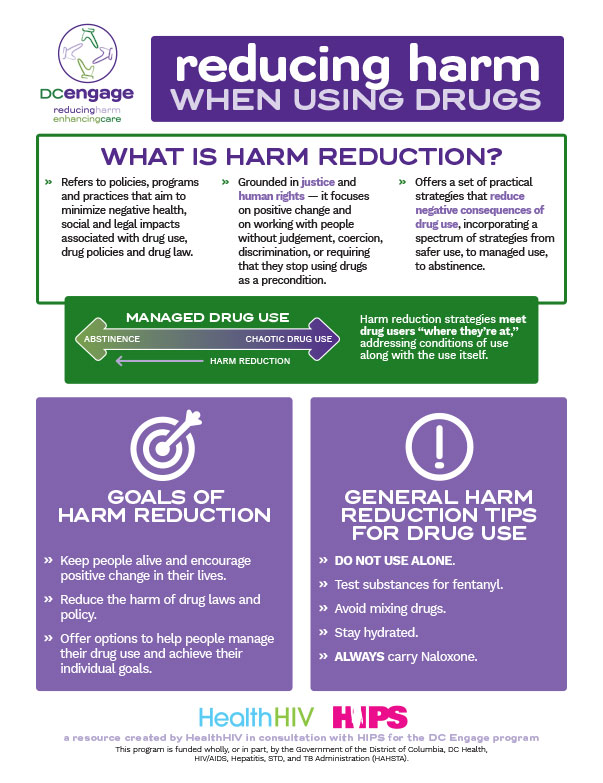Resources
These comprehensive and diverse resources cover a wide range of Harm Reduction topics, from addiction treatment to overdose prevention. The library contains resources, tools, and information on services for both healthcare providers and the community.
Latest Resource
-
Community Mapping and Identifying Priority Populations for HIV Prevention and Care
This 2023 Community Mapping Toolkit for D.C. Organizations details how visualizing health disparities can help outreach programs for HIV prevention. The toolkit explores how community mapping can support your work, what goes into creating a community map, and how to use mapping tools that are available online.
Featured Resource

Reducing Harm When Using Drugs
This downloadable PDF provides general harm reduction tips for drug use and information on local harm reduction organizations in the Washington, DC area.
Resource Library
Filter Resources
Sample Patient Agreement Form
This resource includes two sample patient agreement forms that can be used with patients who are beginning long-term treatment with opioid analgesics or other controlled substances.
States Allowing Telehealth Prescriptions for Opioid Use Disorder
A Resource from the National Academy for State Health Policy.
The American Opioid Epidemic in Special Populations: Five Examples
This manuscript identifies segments of the population that are disproportionately affected by the opioid epidemic.
The ASAM National Practice Guideline for the Treatment of Opioid Use Disorder – 2020 Focused Update
The ASAM National Practice Guideline 2020 focused update is intended to inform and empower clinicians, health system administrators, criminal justice system administrators, and policymakers who are interested in implementing evidence-based practices to improve outcomes for individuals with OUD. This is especially critical in the context of the ongoing COVID-19 emergency, which threatens to curtail patient access to evidence-based treatment.
The ASAM Treatment of Opioid Use Disorder Course
The ASAM Treatment of Opioid Use Disorder (TOUD) Course covers all medications and treatments for opioid use disorder, and provides the required education needed to obtain the waiver to prescribe buprenorphine. ASAM is an approved provider by CSAT/SAMHSA of DATA 2000 training.
The COVID-19 Pandemic: Practice and Policy Considerations For Patients with Opioid Use Disorder
This article details US policy updates that are loosening restrictions around MOUD prescribing in light of COVID-19.
The Curbsiders Podcast #187 Buprenorphine Master Class: Managing Opioid Use Disorder for the Generalist
Get comfortable with counseling and pharmacotherapy for OUD with tips from Dr. Michael Fingerhood (Johns Hopkins).
The Opioid Crisis and the Black/African American Population: An Urgent Issue
This issue brief presents recent data on prevalence of opioid misuse and death rates in the Black/AA population; contextual factors & challenges to prevention & treatment; innovative outreach & engagement strategies to connect people to evidence-based treatment; and the importance of community voice.
The Trevor Project Lifeline
The Trevor Project provides Direct suicide prevention and crisis intervention services to support via phone, text, and chat for LGBTQ+ youth. Dial 1-866-488-7386 to get connected.
TIP 63: Medications for Opioid Use Disorder
This Treatment Improvement Protocol (TIP) reviews the use of the three Food and Drug Administration (FDA)-approved medications used to treat OUD—methadone, naltrexone, and buprenorphine—and the other strategies and services needed to support recovery for people with OUD.
Trans Lifeline
Trans Lifeline is a grassroots hotline and microgrants 501(c)(3) non-profit organization offering direct emotional and financial support to trans people in crisis – for the trans community, by the trans community. Dial 1-877-565-8860 to get connected.
Trauma-informed, Recovery-oriented System of Care Toolkit
The Trauma-informed, Recovery-oriented System of Care Toolkit, gives actionable guidance to create a framework to implement trauma-informed and recovery-focused initiatives, along with scripts, tools, concrete strategies, and recommendations for your community.
